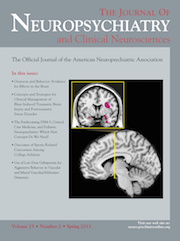Aripiprazole Treatment for Choreoathetoid and Psychotic Symptoms of Huntington’s Disease
To the Editor: In this case report, we are presenting a 50-year-old man who has Huntington’s disease with choreoathetoid and psychotic symptoms. After 16 months of initial aripiprazole treatment, our patient showed significant progress with chorea and psychosis.
Huntington's disease (HD), caused by CAG trinucleotide repeat expansion in the IT15 gene located on the short arm of chromosome 4; is an autosomal dominant, progressive, neurodegenerative disorder, characterized by motor, cognitive, and psychopathological symptoms.1 In this letter, we report a case of a male patient with HD with psychotic symptoms in whom aripiprazole effectively controlled these psychotic symptoms and involuntary movements.
Case Report
The patient, a 50-year-old man diagnosed 20 years previously with HD, first complained about tremor in the extremities and, in time, involuntary movements of the extremities and the body; gait difficulties and dysphagia added to his clinical presentation. He partially benefited from quetiapine 300 mg/day and clonazepam 2 mg/day during the last 1.5-year period. For the last 2 months, he has had insomnia, aggression, self-destructive behaviors, suicidal thoughts, and persecutory delusions, and his relatives took him to our outpatient clinic. On admission to our department, he scored 56 point on Unified Huntington’s Disease Rating Scale (UHDRS) motor section (oculomotor function, 12; hyperkinesias, 22; fine motor tasks, 9; parkinsonism, 4; gait, 9). We started aripiprazole treatment and gradually titrated up to 30 mg/day. In the first month of the treatment, we confirmed that irritability and persecutory delusions were markedly improved; his choreiform movements decreased significantly; and he finally became able to satisfy his own daily needs. At the end of the 16-month follow-up, we evaluated that his personal hygiene was significantly improved; dysarthria and dysphagia were completely ameliorated; and the intension and amplitude of choreiform movements were decreased. The patient still had no psychotic symptoms. We assessed that the last UHDRS total motor score was 20 (oculomotor function, 4; hyperkinesias, 6; fine motor tasks, 2; parkinsonism, 2; gait, 6).
Discussion
HD is explained by the loss of the striatal cells, caused by degeneration and apoptosis2 and their dysfunction,3 which are made sensitive to glutamate and dopamine by mutant huntingtin protein. In this respect, the dopamine receptor-antagonist drugs may purport to be useful in treatment of HD. Aripiprazole, as an antipsychotic agent, acts as a partial agonist and affects psychotic symptoms by blocking mesolimbic dopaminergic neurotransmission, while rarely inducing extrapyramidal side effects, by reducing the antagonist load at the nigrostriatal pathway with selective D2 ligand and 5HT2A receptor antagonism.4 Our case report supports the idea that aripiprazole is an effective and safe agent in HD, especially HD with psychotic symptoms.
1 : Huntington’s disease. Lancet 2007; 369:218–228Crossref, Medline, Google Scholar
2 : Dopaminergic and glutamatergic signaling crosstalk in Huntington’s disease neurodegeneration: the role of p25/cyclin-dependent kinase 5. J Neurosci 2008; 28:10090–10101Crossref, Medline, Google Scholar
3 : The corticostriatal pathway in Huntington’s disease. Prog Neurobiol 2007; 81:253–271Crossref, Medline, Google Scholar
4 : Aripiprazole: a new atypical antipsychotic with a different pharmacological mechanism. Prog Neuropsychopharmacol Biol Psychiatry 2004; 28:1213–1219Crossref, Medline, Google Scholar



